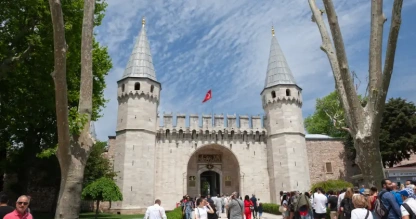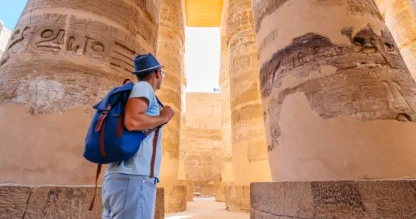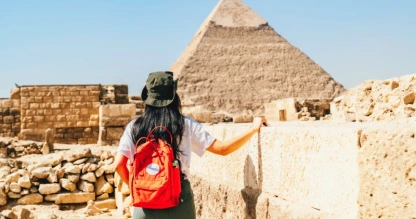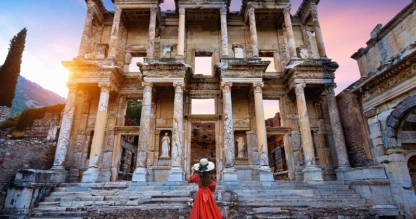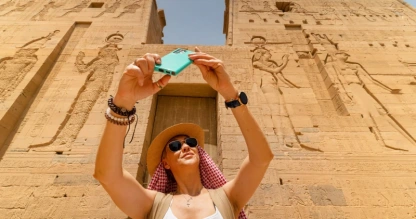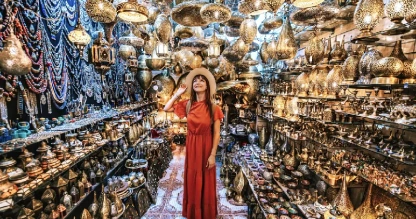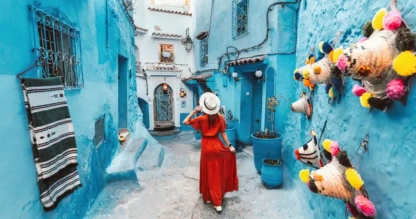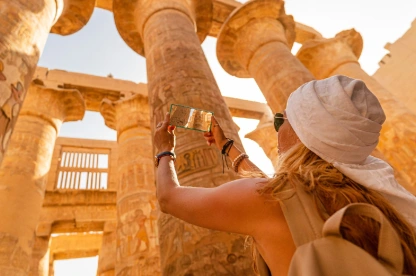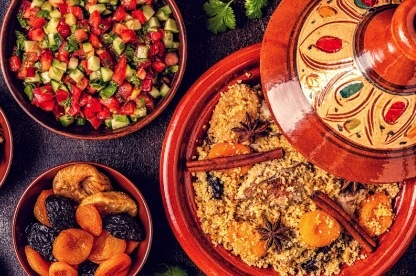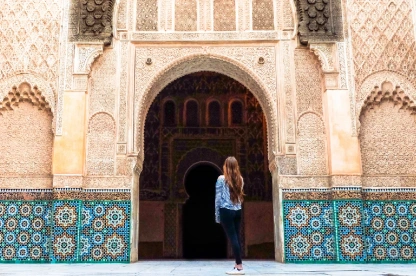Table of Contents:
Turkey Travel Tips for First-Time Visitors
Where East and West meet, Turkey provides first-time travelers with an experience of 8,500 years of history, culture, and stunning landscapes. From Istanbul's Grand Bazaar to Cappadocia's surreal skylines, and Ephesus's ancient ruins to Pamukkale's natural pools, each corner has a story to tell. English is spoken throughout tourist areas, but a few Turkish words go a long way with the locals.
This travel guide of Turkey will take you on all that you will need for a journey to remember, including highlights, tips, and must-not-miss attractions along the way.
What Makes Turkey a Must-Visit Destination?
Turkey sits at the crossroads of Europe and Asia where history, culture, and landscape meet in a breathtaking symphony. From Göbeklitepe's columned past to Ephesus's streets of marble, the country is full of archaeological treasures. Gazing in awe at Ottoman mosques, Roman theaters, or Byzantine mosaics, Turkey offers an open-air museum on every street corner.
But it's not just about the past. Turkey's landscapes are just as stunning. You can journey from the foggy tea-covered mountains of the Black Sea to the surreal rock valleys of Cappadocia and the blue coastlines of the Mediterranean, all in one trip.
Food lovers will find Turkish cuisine to be as diverse as it is delicious. From crispy börek and honeyed baklava to fiery kebabs and dainty manti, every region has something special to offer. Here, hospitality is not just a tradition but a way of life. A local is likely to offer you a cup of tea or a home-cooked meal.
Add that to the bustling bazaars, low prices, and endless one-of-a-kind experiences, and it's no wonder that Turkey continues to surprise tourists from around the globe. It's important to start with some essential Turkey travel tips.

Must-visit places in Turkey
Turkey is a living museum where nature and history unite. These five iconic destinations offer a perfect introduction to the country’s timeless beauty and culture.
Istanbul
Istanbul proudly wears its imperial legacy as the ancient capital of Byzantine, Roman, and Ottoman empires. The city's outline rises dramatically where the Bosphorus divides two continents, capped by the breathtaking Hagia Sophia. This engineering marvel is perhaps history's deepest sacred space—once a Byzantine cathedral, then an Ottoman mosque, now a museum where golden mosaics sparkle beneath giant domes.
The nearby Topkapı Palace runs as a labyrinth of courtyards and rooms in which sultans once ruled their vast empire, its treasure chambers overflowing with imperial riches and sacred Islamic relics.
Six soaring minarets announce the Blue Mosque, whose interior walls display over 20,000 hand-painted İznik tiles in brilliant patterns of blue and white.
The Grand Bazaar lures visitors along a maze of 61 indoor alleys lined with thousands of stores, and the aromatic Spice Bazaar delights foodies with spice pyramids of stacks, lokum (Turkish delight), and dried fruits.
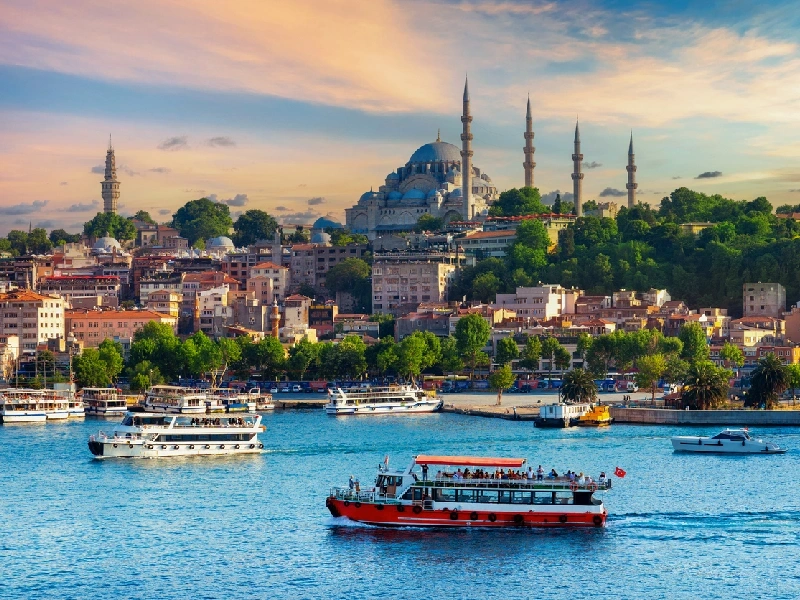
Cappadocia
Cappadocia presents a landscape so fantastical it seems conjured from dreams rather than geological processes. Millions of years of volcanic eruptions and erosion have sculpted a moonscape of "fairy chimneys"—conical rock formations that rise improbably from the Anatolian plateau.
Each morning the sky is ablaze with hundreds of hot air balloons whose colored canopies silently drift over valleys and one of travel's most scenic sights. The region's soft volcanic tuff rock was perfect for carving, and early Christians carved out elaborate underground cities and cave churches adorned with incredible frescoes.
10th- to 12th-century monasteries and churches are preserved in the Göreme Open-Air Museum, their walls adorned with Byzantine religious paintings whose colors remain vibrant after nearly a thousand years.
Modern hoteliers have turned these ancient cave homes into state-of-the-art lodging, where tourists may rest in the same rock formations that sheltered old civilizations.

Pamukkale
Pamukkale, meaning “cotton castle” in Turkish, looks like something out of a dream. Its bleached-white terraces, formed over the centuries by calcium-rich thermal waters, spill down the side of the mountain like a frozen waterfall.
For centuries, prized for their therapeutic properties, these natural hot springs have been visited by tourists as far back as Roman times, when the ancient city of Hierapolis loomed above them.
Today, you can stroll through the ruins, including a massive hillside amphitheater, and then soak your feet in hot mineral waters like bathers have for centuries. The surreal combination of turquoise water and snow-white rock is one of Turkey's most beautiful and memorable places.

Ephesus
Ephesus is one of the most stunning ancient towns you can visit—not just in Turkey, but anywhere. Walking on its white marble streets, you'll behold sites of legend, such as the Library of Celsus with its looming two-story façade, and the massive Great Theater, seating 25,000.
See into hillside terraced homes to glimpse the sort of life rich people once led,with heated floors, piped water, and sunny mosaics.
Nearby are the remains of the legendary Temple of Artemis, one of the Seven Wonders of the Ancient World, that leave nothing to the imagination concerning the city's golden age. Ephesus is not a vacation, it's a walk through living history.
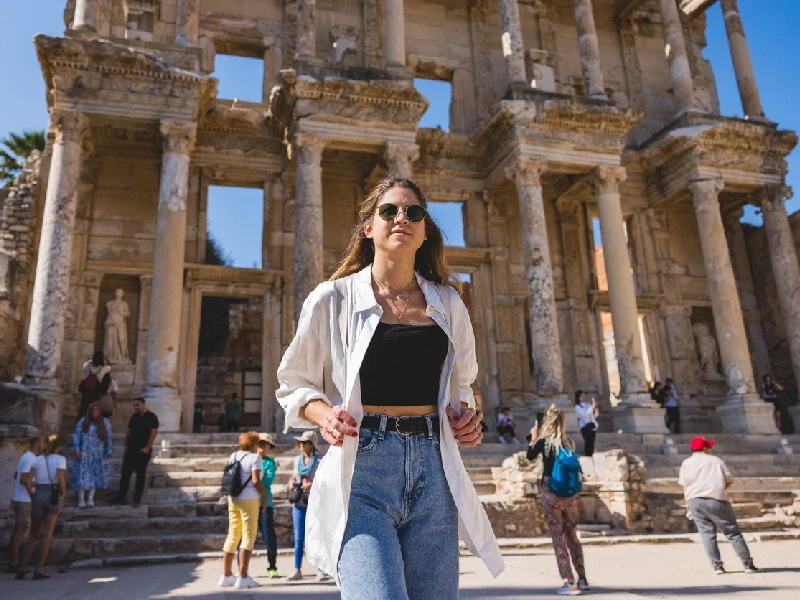
Antalya & the Turkish Riviera
The Turkish Riviera, or Turquoise Coast, is where golden beaches meet ancient history in one unforgettable setting. From pine-covered mountains falling into the Mediterranean to golden beaches and secluded coves, it's a beach holiday and history enthusiast's wishes come true.
Antalya, the gem of the Riviera, blends modern resort living with ancient ambiance in its historic Kaleiçi district, where Ottoman town houses and Roman ruins like Hadrian's Gate remain.
Along the coast, explore ancient towns like Side, where temples rise out of the beach, or Patara, with Turkey's longest beach and one of the world's oldest parliament buildings. From luxury in Belek to bohemian style in Kaş and Kalkan, the Turkish Riviera offers the ideal mix of relaxation, beauty, and heritage.

Essential Turkey Travel Tips
For visitors, understanding local life and traditions can be a big difference. This Turkey travel guide covers key essentials to help you feel at ease while exploring the country.
Turkish Currency
In Turkey, the official currency is the Turkish Lira (₺), available in both coins and banknotes. Credit cards are widely accepted in cities, but cash is essential for small shops, taxis, and markets. Carry smaller bills for easier transactions.
Language: The Turkish Tongue
Turkish serves as the lifeblood of national identity, yet English descends upon tourist hotspots through educational focus. Along the sun-drenched Mediterranean and Aegean seaboards, English resonates widely among hospitality and commerce staff.
Thoughtful visitor garners immense goodwill through mastery of elementary Turkish expressions:
- "Merhaba" (hello) opens conversations with warmth.
- "Teşekkürler" (thank you) acknowledges kindness.
- "Evet" (yes) and "Hayır" (no) provide fundamental responses.
Transport
Turkey has a rich transportation tapestry that binds its varied regions together with incredible efficiency. Domestic flights connect principal cities at surprisingly reasonable prices outside national holiday seasons.
The classic intercity bus network is the backbone of overland travel, with firms competing on amenities that frequently include reclining seats, frequent refreshment service, and considerate rest stops.
Inside city boundaries, the dolmuş (minibuses shared by multiple individuals) offer affordable travel, operating under the amiable principle of departure when full capacity is achieved rather than adhering to set timetables.
Istanbul and Izmir have the added pleasure of ferry travel, where practical necessity becomes scenic delight as boats traverse the waters dividing Asian and European shores.
Turkish Culture
Sacred sites call for appropriately humble dress—visitors to mosques must cover shoulders and legs and have women carry headscarves to cover themselves before entering.
Mosque doors and home entrances are the lines that mark the spot where footwear must be discarded, an ancient practice that keeps the sanctity of interior space.
Turkish hospitality is the most cherished cultural tradition, creating contexts in which strangers extend sincere offers of food or beverage. Manners dictate a polite first rejection, as true offers will continually be renewed, manners instruct yielding by the third offer.
Visa Requirements
Most foreign nationals need an e-Visa before their arrival. The three-minute electronic application can be submitted at any time.
Electronic permits are strictly for tourism and business; other purposes need conventional application through Turkish diplomatic missions. Traveler-friendly hosts ensure passport validity for at least six months from the intended departure date.

What to Eat in Turkey
Breakfast Like a Local
Start your day like the Turks with breakfast, a table spread in truth of taste: beyaz peynir and kaşar cheese, both mature; olives; cucumbers; tomatoes; honey; and kaymak (luxuriant creamy treat). Do not forgo menemen—eggs cooked with tomatoes, peppers, and onions. All is followed by bottomless tulip-cup tea.
Kebabs, Dumplings & More
No Turkish guide is complete without kebabs. Savor the spicy hot Adana kebab, or go for the legendary Iskender, in which sliced lamb is piled onto pita and served smothered with tomato sauce and butter. For home-style flavor, mantı—little dumplings of lamb, served with spicy garlicky yogurt and spices—is a nationwide favorite.

Street Food Stalls Worth Enjoying
Turkish street food is quick and memorable. Grab a hot simit, the sesame-coated ring of bread sold from bright red wagons. Try lahmacun, a thin flatbread topped with spiced meat, or watch gözleme being freshly prepared on a griddle, filled with spinach, potatoes, or cheese.
A Sweet Finish: Desserts & Drinks
Dessert is not a joke in Turkey. Baklava, its buttery pastry and nut layers dripping with syrup, is a necessity. Or künefe, a sweet warm dessert of shredded wheat pastry and cheese, baked until crispy and sweet.
Wash it all down with a cold glass of ayran or sip on traditional Turkish coffee, served strong and often with a cube of lokum (Turkish delight).

Frequently asked questions
Q1: What do I need to know before traveling to Turkey?
Before heading to Turkey, check if you need an e-visa, pack modest clothing for visits to mosques, and learn basic phrases. Public transportation is reliable, and tipping is appreciated. These are essential Turkey travel tips to make your trip more comfortable.
Q2: What is needed when traveling to Turkey?
You’ll need a valid passport, possibly a visa depending on your nationality, and travel insurance is highly recommended.
Q3: What are the must-sees in Turkey?
Must-see spots include Istanbul’s Hagia Sophia and Grand Bazaar, the fairy chimneys of Cappadocia, Pamukkale’s white travertines, Ephesus’ ancient ruins, and the beaches along the Turkish Riviera. These iconic sites are top recommendations in every Turkey travel guide.
Q4: What is the best currency to bring to Turkey?
Turkish Lira is best for everyday purchases, though many tourist shops also accept USD and Euros. For better rates, exchange a small amount before arrival and more at local exchange offices.
Q5: Should I carry cash to Turkey?
Yes, cash is important for local markets, small cafés, and places that don’t accept cards. Keep smaller notes for taxis and tips. One of the top Turkey travel tips is to use cash when bargaining or in rural areas where card machines may be unreliable.
Q6: What is traditional Turkish food?
Traditional Turkish cuisine includes dishes like kebabs, manti (Turkish dumplings), börek, and sweets like baklava and künefe. Breakfast spreads (kahvaltı) are a cultural experience.
Ready to explore Turkey and the best destinations in the Middle East? Book your Turkey tours now!
Find Other Blogs
Explore the 10 best things to do in Dubai, from world-famous sights and thrilling adventures to unique cultural experiences for every type of traveler.
Explore the best destinations in Middle East, from ancient wonders to modern marvels, perfect for culture lovers, adventure seekers, and beach fans alike.
Explore the timeless wonders of Egypt, from ancient pyramids to majestic temples, in this ultimate guide to the country’s most iconic sites.
Explore the magic of Wadi Rum, Jordan’s desert gem filled with red sands, towering cliffs, and unforgettable Bedouin adventures.
Get ready for your trip with these essential Turkey travel tips, covering culture, food, key sights, and must-know advice for first-time visitors!
Discover the rich flavors of Moroccan cuisine: tajines, couscous, street bites, and sweet treats you won't want to miss!
Discover the best beaches in Greece, from hidden gems to iconic shores, on unforgettable Greece tours filled with sun, sea, and stories.
Discover the most visited places in Istanbul, including top sites, historic landmarks, and must-see spots in this vibrant city.
Experience the thrill of a Dubai desert safari with dune bashing, camel rides and sunset views in one unforgettable adventure.
Explore the imperial cities of Morocco, Fez, Marrakesh, Rabat, and Meknes and experience rich history, culture, and stunning architecture.


